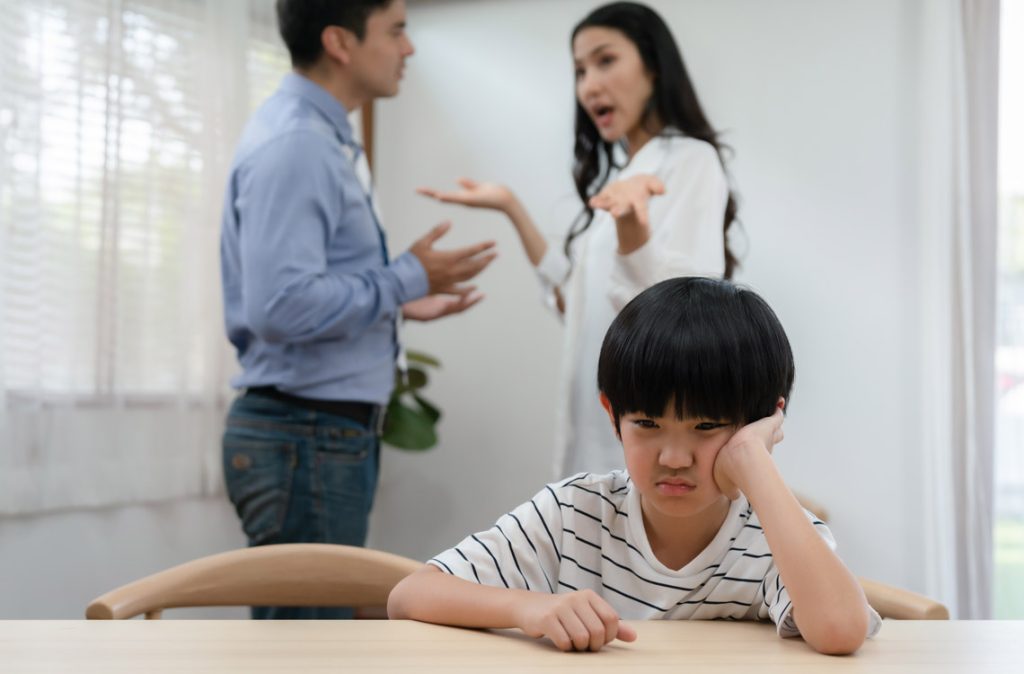Cards on the table, parenting can be hard. And marriage isn’t always a fairytale.
There are days when you’re just trying to survive through another errand, another chore, another temper tantrum.
Resentment builds and builds.
Then, something your partner says or does sets off the fuse.
Before you know it, you’re raising your voice, pointing fingers, and turning what was a small disagreement into a full-blown fight.
While this may feel normal (and let’s face it, sometimes inevitable), regularly arguing in front of your children can have long-lasting effects.
Let’s explore why keeping conflict behind closed doors is more important than you might think.
When Kids Become Casualties
Children are highly sensitive to their surroundings.
When parents fight, kids absorb the tension, the body language, and even the silences.
If they’re pulled into the argument (whether directly or indirectly), it can take a serious toll on their emotional wellbeing.
According to psychiatrist Professor Chong Siow Ann, one of the biggest dangers of parental conflict is when children are caught in the crossfire.
Some parents, often unknowingly, involve their kids in the argument.
They vent to them, ask them to pick sides, or use them as messengers.
This puts the vulnerable and impressionable child in an impossible position.
A parent should never place those kinds of emotional burdens on the shoulders of someone far too young to carry them.
When this happens repeatedly, your child may start feeling like a pawn instead of a person.
They might feel guilty, confused, anxious, or worse.
They may even start to believe that they’re somehow responsible for the conflict.
Over time, this can damage their sense of security and self-worth.
The Science of Parental Conflict
Research supports what many child psychologists have been saying for years: exposure to frequent, intense, or poorly resolved conflict between parents can negatively impact a child’s development.
This includes their emotional regulation, social relationships, academic performance, and even physical health.
According to psychologists, children who witness constant fighting are more likely to develop anxiety, depression, and behavioural issues.
Their brains learn to operate in a state of alertness, as if always preparing for the next argument.
And if parents shout, insult, or blame each other in front of their children, these children may grow up believing that this is what love and communication look like.
Even babies, who can’t understand words yet, are affected by the emotional tone of their environment.
Raised voices and angry expressions can trigger stress responses, which, over time, may affect how they form attachments and manage stress later in life.
Resolve Conflict Peacefully
Conflicts in a marriage are inevitable—you and your spouse are bound to butt heads sooner or later.
The key is not to aim for perfection but to be mindful.
This doesn’t mean you should never argue or that you must put on a fake happy face 24/7. Kids don’t need perfect parents.
They need emotionally healthy ones.
Seeing parents disagree respectfully and then work through a problem calmly can actually be a great lesson in conflict resolution.
What’s important is how you argue and when.
If you find your conversation escalating, it’s okay to hit pause and continue later when the kids are asleep or out of earshot.
It’s also helpful to let your child know that disagreements are normal and that adults sometimes get upset—but it’s never the child’s fault.
And if your child does witness a tense moment, make time afterwards to reassure them.
Let them know they are safe, loved, and not to blame.
This goes a long way in helping them process what they’ve seen.
The Secret of Conflict Resolution
Disagreements in any relationship are inevitable.
But turning those disagreements into teachable, non-threatening moments requires boundaries.
Here are a few to consider:
- Indoor voices only: Keep the conversation calm, or take a break.
- Preserve safe spaces: Don’t argue in front of your child’s bedroom or during family meals.
- Communicate directly: Never ask your child to relay messages to your spouse.
- Leave the kids out of it: Don’t try to pit your kids against each other, or use them as weapons. They are not pawns in your little tiff.
- Close the doors: Avoid bringing up sensitive topics when your child is nearby that may trigger an argument.
When parents protect their children from the emotional spillover of adult issues, they send a clear message: ‘Your emotional safety matters to us.’
Finally, let’s not forget that constantly arguing in front of your children doesn’t just hurt them—it hurts you.
It’s emotionally draining, builds resentment, and chips away at the trust between partners.
Seeking help, whether it’s therapy, counselling, or just a few honest conversations, can help break the cycle.
If your partner isn’t open to that yet, you can still start by changing your own approach.
The calmer and more aware you are, the more likely the conflict will de-escalate.
A Calm Home is a Happy Home
At the end of the day, every parent wants to create a home that feels safe, loving, and stable.
This doesn’t mean there won’t be bumps along the way—it just means you’re willing to protect your kids from unnecessary emotional harm, even when life gets messy.
So, the next time tensions rise, take a deep breath.
Step into another room.
Then, have the tough talk after bedtime.
Because little ears hear more than you think, and it’s best to keep those arguments behind closed doors.
Disclaimer: The information provided in this article is for informational purposes only and should not be considered as medical advice from Mamahood. For any health-related concerns, it is advisable to consult with a qualified healthcare professional or medical practitioner.
For more insightful stories and parenting advice, stay tuned to Mamahood Singapore!
